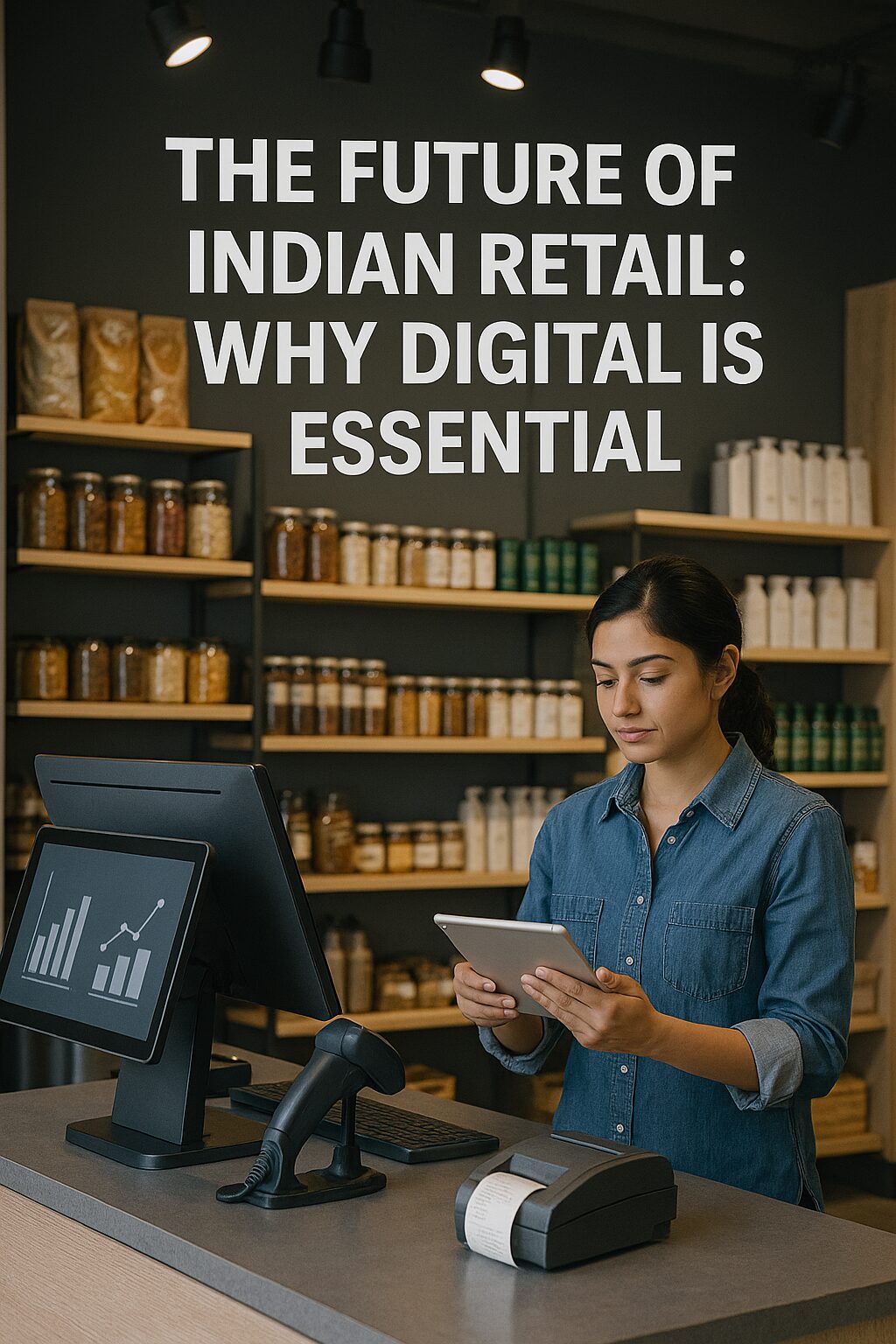
- September 2, 2025
- AxonTrail Editorial Team
- 0
The Indian retail sector is one of the most dynamic markets in the world. With a customer base of over 1.4 billion people and a market size valued at more than USD 1.1 trillion, it is a space where tradition meets innovation. Yet, as consumer preferences evolve rapidly, the real question every business must ask is: Why Digital is Essential for Indian Retail?
The answer lies in technology’s ability to reshape customer journeys, streamline operations, and ensure long-term survival. This blog explores in detail how digitalisation is rewriting the future of Indian retail and why adopting it is no longer optional.
At AxonTrail Solutions, we understand that the future of Indian retail lies in simplicity, speed, and smart systems. Our cloud-based, AI-powered platform empowers retailers—whether it’s a local kirana shop or a fast-growing chain—to digitise billing, manage inventory with QR/barcode tracking, and streamline purchases effortlessly. With built-in GST compliance and real-time dashboards, you get complete visibility and control without needing a dedicated IT team.
What sets AxonTrail apart is our human-first approach. We don’t just sell features—we build freedom. Our solutions enable you to serve customers faster, reduce stock leakages, and make smarter business decisions backed by data. By adopting AxonTrail, Indian retailers can stay competitive, deliver memorable customer experiences, and grow sustainably in a digital-first world.
1. Shifting Consumer Expectations
Consumers in India are no longer satisfied with the basics. They want faster deliveries, personalised offers, seamless experiences, and multiple payment options. The kirana shop that relied only on word-of-mouth is now competing with modern trade stores and e-commerce giants.
This shift is one of the core reasons why digital is essential for Indian retail. Only digital tools—like AI-driven recommendations, mobile apps, and cloud-based billing—can match the pace of today’s evolving customer behaviour.
2. Rise of E-Commerce and Omnichannel Models
E-commerce platforms such as Flipkart, Amazon, and niche D2C brands are reshaping shopping habits. Customers often browse online, compare prices, and then choose whether to buy online or offline.
Retailers are adopting omnichannel strategies—integrating physical stores with online channels. This ensures consistency across touchpoints. Once again, this highlights why digital is essential for Indian retail: without digital integration, businesses cannot provide a smooth omnichannel experience.
3. The Digital Payments Revolution
The success of UPI (Unified Payments Interface) has made India the world leader in digital transactions. Even a small tea stall or paan shop now accepts QR-based payments.
This transparency builds customer trust, improves financial inclusion, and provides retailers with access to small business loans. Digital payments prove yet again why digital is essential for Indian retail—cash-only operations simply cannot match today’s competitive edge.
4. Data-Driven Decision Making
Retailers today generate massive amounts of data: sales, footfall, inventory, customer preferences, and supplier records. With digital dashboards and AI tools, retailers can:
Forecast demand
Optimise inventory
Personalise offers
Track loyalty patterns
This is why digital is essential for Indian retail—because data-driven insights separate thriving businesses from those that fade away.
5. Empowering Kirana Stores with Technology
The backbone of Indian retail is the humble kirana store. For decades, these family-run shops relied on relationships and credit books. But digital tools are revolutionising them with:
Mobile billing systems
QR/barcode-based inventory
WhatsApp ordering
Hyperlocal delivery apps
This shows clearly why digital is essential for Indian retail—even the smallest kirana can compete with large supermarkets through affordable digital adoption.

6. Supply Chain and Logistics Transformation
Timely delivery and stock availability make or break a retail business. Digitally managed supply chains offer:
Real-time tracking of goods
Automated purchase orders
Stock alerts
Route optimisation for delivery vans
By reducing delays and leakages, retailers save costs and serve customers better. This reinforces why digital is essential for Indian retail in ensuring efficient operations across India’s vast geography.
7. Personalisation and Customer Loyalty
Today’s customers don’t just want products; they want experiences. Retailers are using CRM systems, loyalty apps, and AI recommendations to engage customers meaningfully.
Whether it’s birthday discounts, personalised product suggestions, or gamified loyalty points, digital tools make customers feel valued. This is another reason why digital is essential for Indian retail—loyalty depends on personalised digital engagement.
8. Regulatory Compliance and GST Integration
Taxation, GST filings, and e-invoicing can overwhelm small retailers. But digital systems automate compliance, reducing errors and penalties.
Retailers using integrated billing and GST solutions enjoy peace of mind and more accurate financial reporting. Compliance is yet another reason why digital is essential for Indian retail—manual methods are no longer sustainable.
9. Future-Proofing Businesses
The pandemic proved that businesses without digital presence struggled to survive. On the other hand, retailers who embraced digital tools—like WhatsApp orders, e-commerce tie-ups, and QR payments—thrived.
This shows why digital is essential for Indian retail: it is not just about growth but survival during unforeseen challenges.
10. Global Competitiveness and India’s Retail Future
As India’s economy integrates with the global market, digital adoption ensures competitiveness. Indian retailers adopting advanced tools can compete not only locally but also globally.
This final point highlights once more why digital is essential for Indian retail—because the future belongs to those who embrace technology, not resist it.
Conclusion
From kirana shops to luxury malls, the Indian retail landscape is undergoing a massive transformation. The core question of why digital is essential for Indian retail has one clear answer: without digitalisation, no retailer—big or small—can meet modern consumer expectations or survive the competitive landscape.
Digital is not just a tool; it is the backbone of future retail in India.
FAQs on Why Digital is Essential for Indian Retail
Q1. Why digital is essential for Indian retail in today’s environment?
Because it helps retailers meet customer expectations, manage operations efficiently, and stay competitive in a fast-changing market.
Q2. How does digitalisation help small kirana stores?
It enables kiranas to use mobile billing, QR codes, and hyperlocal delivery apps to compete with supermarkets and online platforms.
Q3. What role does UPI play in Indian retail?
UPI has made digital payments accessible to all, building transparency and enabling even small shops to accept cashless transactions.
Q4. Why digital is essential for Indian retail in supply chain management?
Because digital tools help track inventory, automate ordering, and optimise delivery, reducing costs and delays.
Q5. Can digital adoption improve customer loyalty?
Yes, through CRM systems, personalised offers, and loyalty programmes, digital adoption enhances customer relationships.
Q6. Why digital is essential for Indian retail during crises like COVID-19?
Because digitalisation helps retailers continue operations via online orders, digital payments, and delivery services during disruptions.
Q7. Does digitalisation reduce costs for retailers?
Yes, it lowers paperwork, reduces human error, optimises stock levels, and improves supply chain efficiency.
Q8. Why digital is essential for Indian retail from a compliance perspective?
Digital systems simplify GST filings, generate e-invoices, and ensure businesses remain tax-compliant.
Q9. How does digitalisation make Indian retailers globally competitive?
By adopting modern systems, Indian retailers can align with international standards and serve global markets efficiently.
Q10. Why digital is essential for Indian retail in the long run?
Because it ensures scalability, sustainability, and readiness for the next wave of technological innovation.
